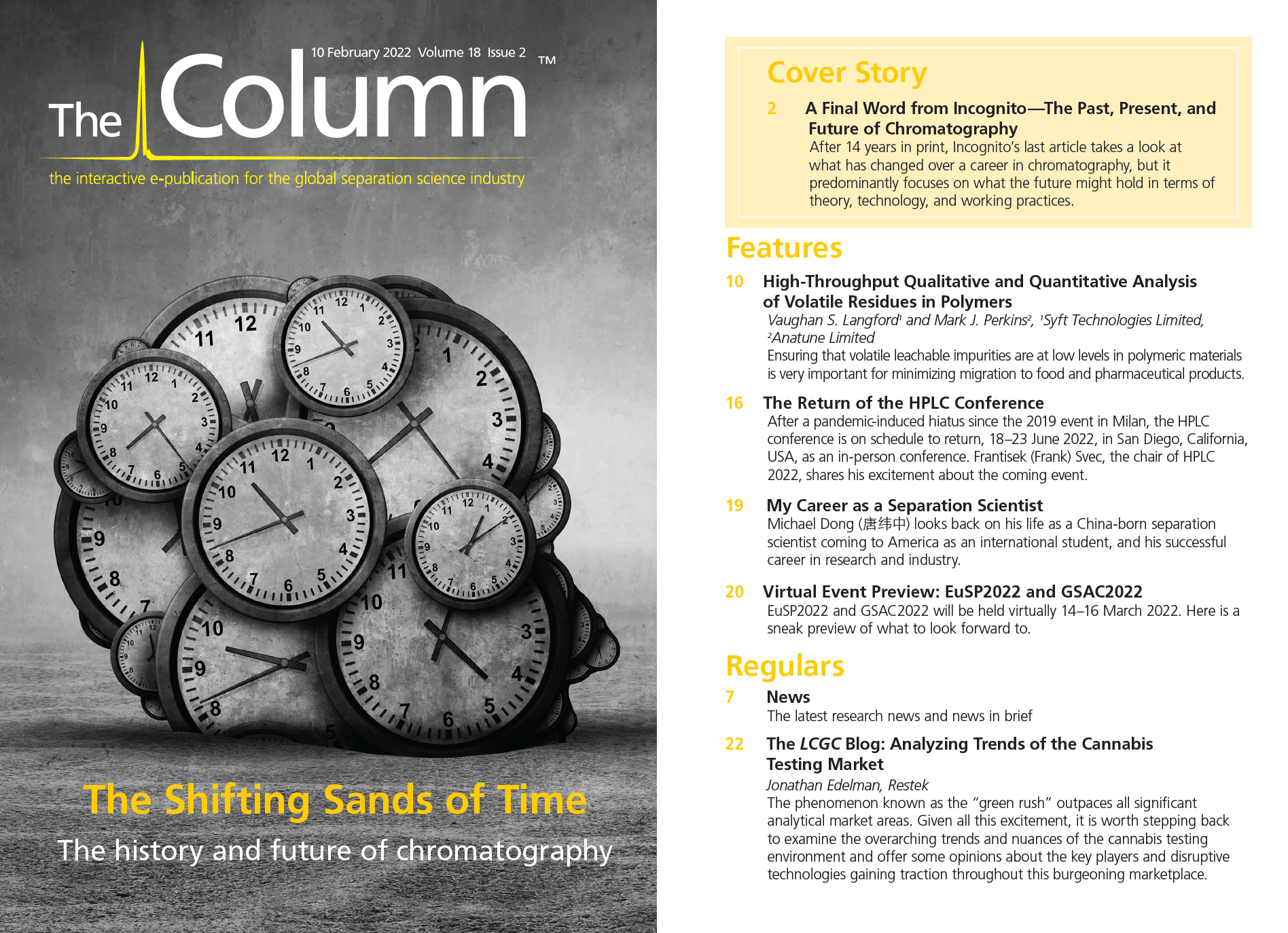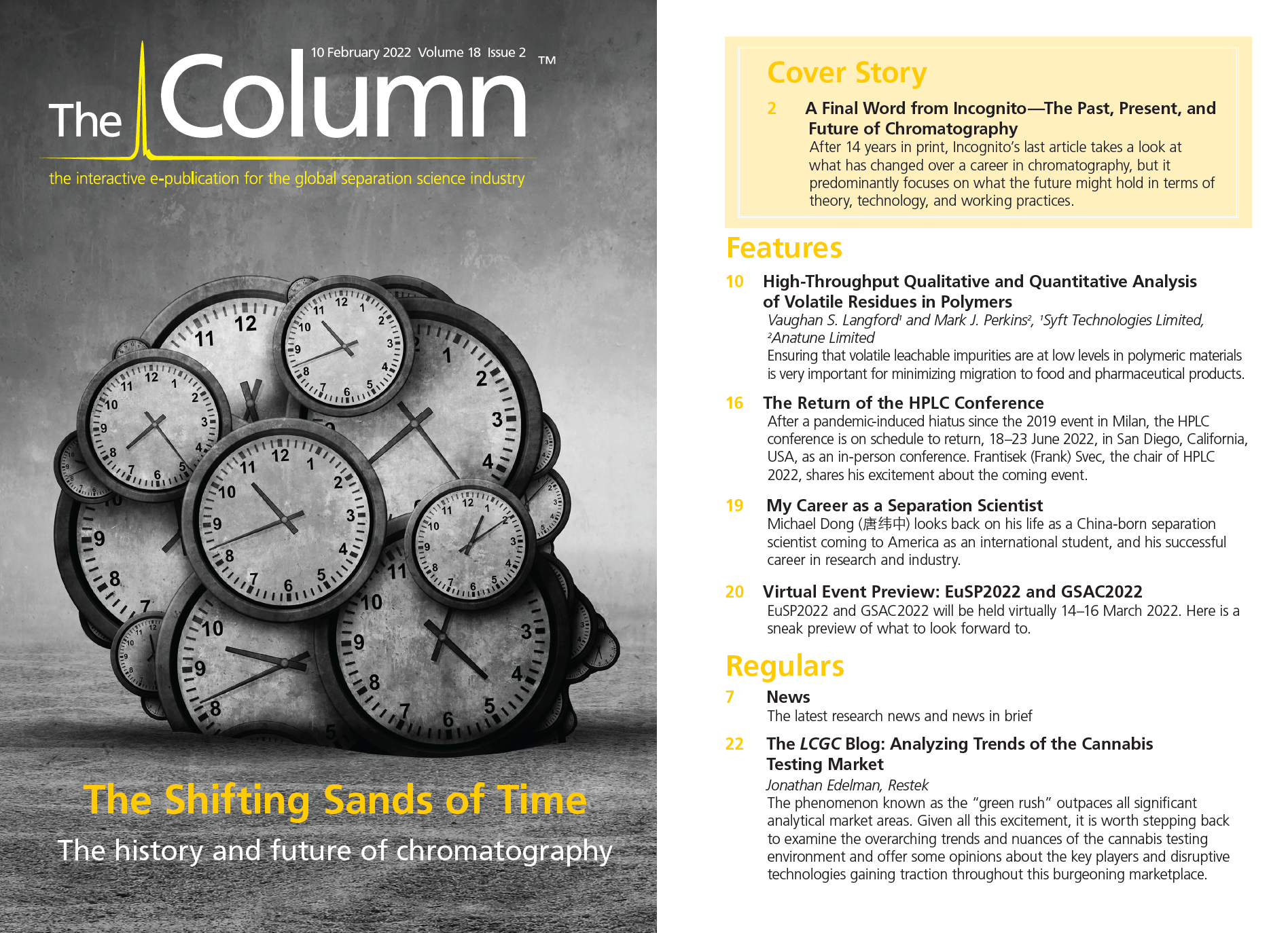Virtual Event Preview: EuSP2022 and GSAC2022
The 2nd European Sample Preparation e-Conference (EuSP2022) and the 1st Green and Sustainable Analytical Chemistry e-Conference (GSAC2022) will be held virtually 14–16 March 2022. Here is a sneak preview of what to look forward to.
In March 2021, the 1st European Sample Preparation Conference, organized by DAC‑EuChemS Sample Preparation Study Group and Network, was successfully concluded. The key theme of “green sample preparation” opened the gate for all challenging ideas, aspects, and problems in sample pretreatment. A plenary lecture on green and sustainable chemistry was presented by Paul T. Anastas (Yale University, USA). In numbers, the impact of this conference is reflected in three plenary lectures, 42 oral presentations, 65 poster presentations (in two parallel sessions), a satellite event dealing with the preparation of manuscripts, and 309 registrations from 35 different countries. In addition, five awards were given to young scientists. Following the success of the 1st European Sample Preparation e-Conference, the EuChemS-DAC Sample Preparation Study Group and Network announced the second edition of this event. This year a new series of conferences are initiated, focusing for the first time on green and sustainable analytical chemistry.
The 2nd European Sample Preparation e-Conference (EuSP2022) and the 1st Green and Sustainable Analytical Chemistry e-Conference (GSAC2022) will be fully virtual and occur simultaneously between 14–16 March 2022. The EuSP2022 and GSAC2022 e-conferences will aim to bring together top experts to discuss new advancements in the sample preparation and green analytical chemistry areas. In each conference, contributed sessions will showcase innovative research, cutting-edge technology, as well as new products and techniques in a broad range of analytical and applied areas in sample preparation and green analytical chemistry. The two events are recognized by the European Chemical Society (EuChemS).
The scientific programmes will include plenary lectures, oral presentations, 2-min flash communications for posters, and discussion sessions to stimulate intense scientific exchange. The annual theme for 2022 is “Interdisciplinary Sample Preparation”. This year the EuChemS-DAC Sample Preparation Study Group will collaborate across science and engineering boundaries to transfer knowledge and integrate the processes, skills, and concepts from other disciplines into sample preparation.
Plenary lectures in the two events will be given by Professor Damiá Barceló, Professor Klaus Kümmerer, and Professor Zhugen Yang. For EuSP2022, relevant researchers of the sample preparation community are confirmed speakers and include: Manuel Miró, Stig Pedersen-Bjergaard, Javier Hernández-Borges, Elefteria Psillakis, Jared Anderson, Gangfeng Ouyang, Rafael Lucena Rodríguez, Victoria Samanidou, María Eugênia Queiroz Nassur, Emanuela Giofriddo, Verónica Pino, Giorgia Purcaro, Cecilia Cagliero, Lorena Vidal, and Barbara Bojko. GSAC is pleased to announce as confirmed speakers: Chiara Cordero, Luigi Mondello, Gert Desmet, Lourdes Ramos, Miguel de la Guardia, Marek Tobiszewski, Mariosimone Zoccali, Miguel Herrero, Davy Guillarme, Andreas Brauer, Chalotta Turner, Teresa Casimiro, and Nora Ventosa.
Registration in the EuSP2022 and GSAC2022 e-conferences is free for the network members. Online registration and abstract submission will take place via the following link. The deadline for abstract submissions for oral presentations is 5 February 2022, while the deadline for posters to be included in the book of abstracts is 12 February 2022. For more information, please visit the webpage of the joint online events.
The European Chemical Society-Division of Analytical Chemistry (EuChemS-DAC) Sample Preparation Study Group and Network was created in 2019. Although it started as a “task force”, prompted after its annual evaluation, it was upgraded to a “study group” owing to its remarkable activity. Study groups are devoted to topics of particular relevance for EuChemS‑DAC, and sample preparation is one of the eight study groups in this field. The DAC‑EuChemS Sample Preparation Study Group and Network is divided into four working groups (WG): 1. Science and Fundamentals; 2. Automation, Innovation, and Entrepreneurship; 3. Information Exchange and Networking; and 4. Green Analytical Chemistry, as a follow-up of the previous year annual theme.
This scientific study group and network is headed by Professor Elefteria Psillakis from the Technical University of Crete and comprises more than 400 members from 37 countries in Europe, America, Asia, Africa, and Oceania working in academia, research institutes, industry, and private laboratories.
The aim of the network is to promote the science of sample preparation, the facilitation of the exchange of information between research teams, the facilitation of collaborations and networking, the linking of research with innovation, the support of young scientists, and the organization of scientific activities, such as conferences, courses, webinars, and support of publications and special issues to disseminate new ideas in this field. Therefore, the network welcomes new regular members professionally engaged in or associated with sample preparation. More information on this action and how to become a member is available at:
https://www.sampleprep.tuc.gr/en/home.
The organizers look forward to e-welcoming you!
Website: https://www.sampleprep.tuc.gr/en/activities/eusp2022-gsac2022-e-conferences

Polysorbate Quantification and Degradation Analysis via LC and Charged Aerosol Detection
April 9th 2025Scientists from ThermoFisher Scientific published a review article in the Journal of Chromatography A that provided an overview of HPLC analysis using charged aerosol detection can help with polysorbate quantification.
Analyzing Vitamin K1 Levels in Vegetables Eaten by Warfarin Patients Using HPLC UV–vis
April 9th 2025Research conducted by the Universitas Padjadjaran (Sumedang, Indonesia) focused on the measurement of vitamin K1 in various vegetables (specifically lettuce, cabbage, napa cabbage, and spinach) that were ingested by patients using warfarin. High performance liquid chromatography (HPLC) equipped with an ultraviolet detector set at 245 nm was used as the analytical technique.
Removing Double-Stranded RNA Impurities Using Chromatography
April 8th 2025Researchers from Agency for Science, Technology and Research in Singapore recently published a review article exploring how chromatography can be used to remove double-stranded RNA impurities during mRNA therapeutics production.
















